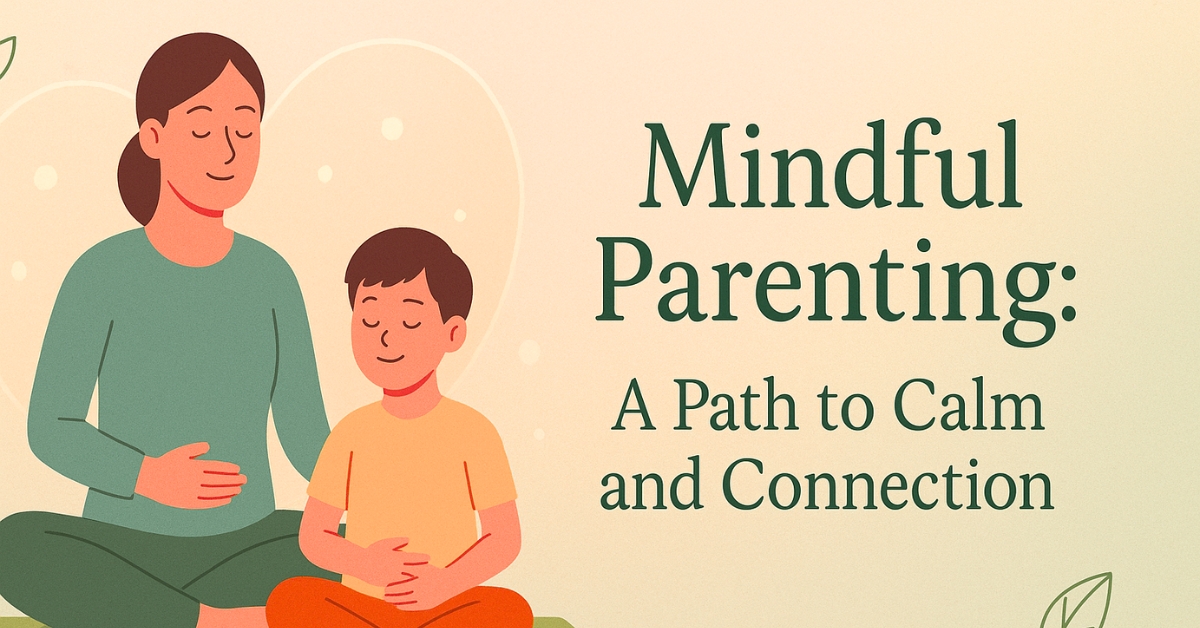Introduction: Why Mindful Parenting Matters Today
Parenting is one of the most rewarding yet challenging journeys in life. We adore our children, but let’s be honest—reading Goodnight Moon for the 87,000th time or stepping on LEGO bricks for the millionth time can feel exhausting. Many parents complain about boredom, frustration, or even losing their temper. This is where mindful parenting comes in. By practicing mindfulness, parents can transform ordinary, sometimes frustrating moments into opportunities for connection, patience, and growth.
What is Mindful Parenting?

Mindful parenting is a practice where parents intentionally bring awareness, presence, and compassion into their interactions with their children. It is not about being a “perfect parent,” but rather being fully present—whether in playtime, mealtime, or even during moments of conflict.
Definition of Mindful Parenting
Mindful parenting can be defined as the practice of observing and engaging with your child in the present moment, without judgment or distraction. Instead of zoning out or reacting automatically, mindful parents pause, breathe, and respond with awareness.
Parenting with Mindfulness

Parenting with mindfulness means accepting that not every moment will be exciting or joyful. Just like every breath is new, every parenting moment is fresh—even if it feels repetitive. When parents shift their perspective from “I’ve seen this before” to “This is happening now,” they discover calmness and patience in even the most mundane routines.
Benefits of Mindful Parenting
Benefits of Mindful Parenting for Parents and Kids

For Parents:
- Reduces stress and anger.
- Helps in managing boredom and frustration.
- Encourages better emotional regulation.
- Increases patience and calmness.
For Kids:
- Improves emotional security.
- Builds trust and stronger parent-child bonds.
- Encourages healthy coping strategies.
- Boosts attention and communication skills.
Mindful Parenting Techniques

Mindful Parenting Techniques to Apply Daily
- Pause and Breathe: Before reacting, take a deep breath.
- Active Listening: Give your child full attention without distractions.
- Non-Judgmental Awareness: Accept your child’s behavior without labeling it “good” or “bad.”
- Model Mindfulness: Children learn by example—show them calmness and presence.
Mindful Exercises for Parents
- Breathing Exercise: Notice each inhale and exhale while interacting with your child.
- Gratitude Practice: End the day by naming three things you appreciate about your child.
- Body Scan: Before bedtime, notice where tension is in your body and release it.
Mindful Parenting vs Traditional Parenting
Traditional parenting often focuses on discipline, control, and routine. In contrast, mindful parenting emphasizes awareness, acceptance, and compassion. Instead of reacting automatically, mindful parents pause, reflect, and respond with care.
Mindful Parenting vs Gentle Parenting
- Gentle Parenting: Focuses on empathy, respect, and positive discipline.
- Mindful Parenting: Adds a layer of self-awareness and present-moment engagement. Both overlap, but mindful parenting is more about the parent’s internal state, while gentle parenting focuses on the external interaction style.
Common Challenges in Mindful Parenting
- Feeling bored during repetitive tasks.
- Struggling with anger or impatience.
- Balancing mindfulness with busy schedules.
- Overcoming the expectation of being a “perfect parent.”
Solution: Treat boredom, anger, or stress as moments to practice mindfulness. Notice them, breathe through them, and let them pass—just like clouds in the sky.
FAQs on Mindful Parenting
How can I be more mindful as a parent?
Start small. Take a few mindful breaths before responding to your child. Put away distractions (like your phone) and give them full attention.
How to practice mindfulness as a mom?
Practice short daily meditations, journaling, or gratitude exercises. Even while cooking or cleaning, focus on the present moment instead of rushing ahead.
Does mindful parenting mean never getting angry?
No. It means acknowledging your anger, pausing, and responding calmly instead of reacting harshly.
Is mindful parenting suitable for working parents?
Absolutely. Mindfulness can be practiced in small moments—during bedtime stories, meals, or car rides.
Conclusion: A More Mindful Future for Families
Mindful parenting is not about perfection—it’s about presence. By practicing awareness, patience, and compassion, parents can transform even the most ordinary parenting moments into opportunities for connection and love. Every breath, every story, every smile is a fresh chance to grow together.




